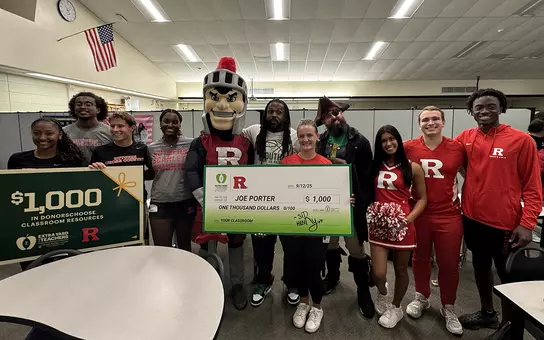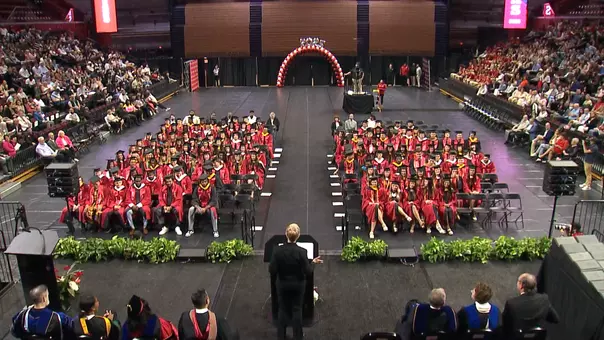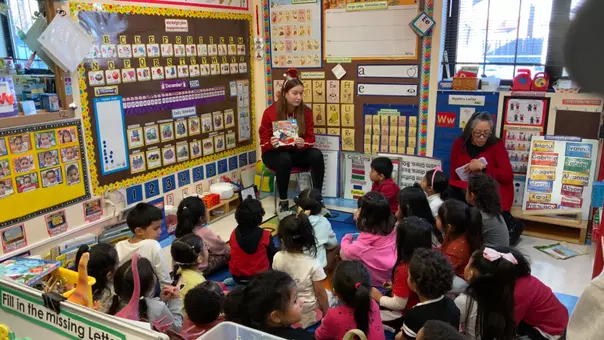
B1G Life Series Leaves Lasting Impact With Scarlet Knights
Aug 06 | Scarlet Knights for Life™
The Selma to Montgomery marches of 1965 were three pivotal protests in Alabama aimed at securing voting rights for African Americans. On March 7, 1965, now known in history as "Bloody Sunday," state troopers and local police violently attacked peaceful marchers on the Edmund Pettus Bridge, sparking national outrage.
The marches, protesting systemic voter suppression in the South, culminated in a successful 54-mile march to Montgomery by March 25, 1965, ending with a major rally. These events were instrumental in the passage of the Voting Rights Act of 1965, which banned discriminatory voting practices.
Sixty years later, from July 18-20, 2025, more than 150 student-athletes and administrators from all 18 Big Ten universities, including a large contingent from Rutgers University, took part in the conference's fourth annual "Big Life Series: Selma to Montgomery" event in Selma, Alabama.
The event featured a ribbon-cutting ceremony, speeches from local officials and Big Ten representatives, and a symbolic march across the historic Edmund Pettus Bridge. Another highlight included the grand re-opening of the renovated Ronnie Sharpe Park Basketball Court, a collaboration between the Big Ten and the city of Selma to restore the court, previously damaged by a tornado. The court is named in honor of the Selma native who, in 1971, lost his life while fighting for his nation in Vietnam.
Big Ten student-athletes also had the opportunity to visit the Tuskegee Airmen Historic Site.
An absolute highlight of the three-day event, according to Monique Brown, Rutgers' Senior Associate Athletic Director for Inclusion, took place in the First Baptist Church, the oldest black church in Selma and one of the four oldest in Alabama, with stirring words delivered by 75-year old Lynda Blackmon Lowery. In March 1965, at the age of 15, Blackmon Lowery was the youngest person to march from Selma to Montgomery. She was beaten in the historic confrontation on the Edmund Pettis Bridge and required stitches to close two cuts on her head.
Lowery returned to march a few weeks later, one of only 300 people allowed to start from Selma again, cross the bridge—with an escort from National Guardsman—and walk for days to Montgomery, where they were joined by thousands of people Lowery's life as a teen in the civil rights movement is documented in her memoir, Turning 15 On The Road To Freedom: My Story of the 1965 Selma Voting Rights March.
"By the time she was 13 or 14, she had been arrested nine times just for supporting voting rights, civil rights and equality. To hear that, I got chills," Brown said. "We're sitting in this church, which is hallowed ground, and she spoke with us about her experiences in those times. It was very special to walk across the Pettus Bridge but what made it even the more impactful were the words she shared with us beforehand."
Football Player Development Assistant Jaden Payoute joined Brown as an additional staff member accompanying six current student-athletes representing Rutgers. Selected for this Big Life Series were football players DJ Allen (a returning participant and one of four Big Ten student ambassadors), CJ Campbell Jr., and Isaiah Crumpler, along with Olivia Norris (track & field), Zora Hardison (volleyball), and Tara Garvey (volleyball).
Elyse Washington, an assistant athletic director who oversees personal enrichment opportunities offered through the Scarlet Knights For Life program, helped to prep these student-athlete for this experience and gathered post-trip reflections. Here are some excerpts from their time in Alabama.
"Going back to Selma, as an ambassador was a fantastic experience," said Allen. "With the addition of traveling to Tuskegee, I was able to add more knowledge to my understanding of our country's history. It was phenomenal being able to share the experience with my peers and embrace a new role."
"Being given the opportunity to see Big Ten athletes come together who share a common history of pain and oppression changed my life," Hardison said. "On this trip I gained a deeper knowledge of what we as African Americans endured for over 200 years. Visiting the Legacy Museum in Montgomery and seeing Kwame Akoto-Bamfo's "Nkyinkyim" series was the most eye-opening part of the weekend. His work evoked emotions of sadness and powerfully highlighted the raw and harsh reality of what slavery was. I now feel inspired to share what I learned about the resiliency of our people and to always acknowledge the humanity in others."
"I had an amazing time going on the B1G Life Trip and I learned so many things that I had never been taught about in my K-12 education, and I loved being able to hear from people in the community of Selma about their experience through some of the most important parts in United States history," said Norris. "This trip made me understand how much of history we have yet to acknowledge and how important it is to learn about what had occurred in the past, despite how terrible and upsetting it may be."
"The two things that I appreciated the most about this trip were a chance to hear real speakers who have heart-wrenching stories to what it was like in the South when they were younger during segregation," said Garvey. "And the museum was one of the most impactful parts of the trip for me. Even though we had two hours, I wish I had more time because it was such a soul-touching museum. So impactful and crafted strategically from the moment you walk in and you are able to better feel and visualize the pain of our ancestors."
A recipient of seven NJ Press Association Awards for writing excellence, John Beisser ('86) served as Assistant Director in the Rutgers University Athletic Communications Office from 1991-2006, where he primarily handled sports information/media relations duties for the Scarlet Knight football and men's basketball programs. In this role, he served as managing editor for nine publications that received either National or Regional citations from the College Sports Information Directors of America (CoSIDA). While an undergraduate at RU, Beisser was sports director of WRSU-FM and a sportswriter/columnist for The Daily Targum. From 2007-2019, Beisser served as Assistant Athletic Director/Sports Media Relations at Wagner College, where he was the recipient of the 2019 Met Basketball Writers Association "Good Guy" Award. Beisser resides in Piscataway with his wife Aileen (RC '95,) a four-year Scarlet Knight women's lacrosse letterwinner, and their 16-year old daughter Riley.
The marches, protesting systemic voter suppression in the South, culminated in a successful 54-mile march to Montgomery by March 25, 1965, ending with a major rally. These events were instrumental in the passage of the Voting Rights Act of 1965, which banned discriminatory voting practices.
Sixty years later, from July 18-20, 2025, more than 150 student-athletes and administrators from all 18 Big Ten universities, including a large contingent from Rutgers University, took part in the conference's fourth annual "Big Life Series: Selma to Montgomery" event in Selma, Alabama.
The event featured a ribbon-cutting ceremony, speeches from local officials and Big Ten representatives, and a symbolic march across the historic Edmund Pettus Bridge. Another highlight included the grand re-opening of the renovated Ronnie Sharpe Park Basketball Court, a collaboration between the Big Ten and the city of Selma to restore the court, previously damaged by a tornado. The court is named in honor of the Selma native who, in 1971, lost his life while fighting for his nation in Vietnam.
Big Ten student-athletes also had the opportunity to visit the Tuskegee Airmen Historic Site.
An absolute highlight of the three-day event, according to Monique Brown, Rutgers' Senior Associate Athletic Director for Inclusion, took place in the First Baptist Church, the oldest black church in Selma and one of the four oldest in Alabama, with stirring words delivered by 75-year old Lynda Blackmon Lowery. In March 1965, at the age of 15, Blackmon Lowery was the youngest person to march from Selma to Montgomery. She was beaten in the historic confrontation on the Edmund Pettis Bridge and required stitches to close two cuts on her head.
Lowery returned to march a few weeks later, one of only 300 people allowed to start from Selma again, cross the bridge—with an escort from National Guardsman—and walk for days to Montgomery, where they were joined by thousands of people Lowery's life as a teen in the civil rights movement is documented in her memoir, Turning 15 On The Road To Freedom: My Story of the 1965 Selma Voting Rights March.
"By the time she was 13 or 14, she had been arrested nine times just for supporting voting rights, civil rights and equality. To hear that, I got chills," Brown said. "We're sitting in this church, which is hallowed ground, and she spoke with us about her experiences in those times. It was very special to walk across the Pettus Bridge but what made it even the more impactful were the words she shared with us beforehand."
Football Player Development Assistant Jaden Payoute joined Brown as an additional staff member accompanying six current student-athletes representing Rutgers. Selected for this Big Life Series were football players DJ Allen (a returning participant and one of four Big Ten student ambassadors), CJ Campbell Jr., and Isaiah Crumpler, along with Olivia Norris (track & field), Zora Hardison (volleyball), and Tara Garvey (volleyball).
Elyse Washington, an assistant athletic director who oversees personal enrichment opportunities offered through the Scarlet Knights For Life program, helped to prep these student-athlete for this experience and gathered post-trip reflections. Here are some excerpts from their time in Alabama.
"Going back to Selma, as an ambassador was a fantastic experience," said Allen. "With the addition of traveling to Tuskegee, I was able to add more knowledge to my understanding of our country's history. It was phenomenal being able to share the experience with my peers and embrace a new role."
"Being given the opportunity to see Big Ten athletes come together who share a common history of pain and oppression changed my life," Hardison said. "On this trip I gained a deeper knowledge of what we as African Americans endured for over 200 years. Visiting the Legacy Museum in Montgomery and seeing Kwame Akoto-Bamfo's "Nkyinkyim" series was the most eye-opening part of the weekend. His work evoked emotions of sadness and powerfully highlighted the raw and harsh reality of what slavery was. I now feel inspired to share what I learned about the resiliency of our people and to always acknowledge the humanity in others."
"I had an amazing time going on the B1G Life Trip and I learned so many things that I had never been taught about in my K-12 education, and I loved being able to hear from people in the community of Selma about their experience through some of the most important parts in United States history," said Norris. "This trip made me understand how much of history we have yet to acknowledge and how important it is to learn about what had occurred in the past, despite how terrible and upsetting it may be."
"The two things that I appreciated the most about this trip were a chance to hear real speakers who have heart-wrenching stories to what it was like in the South when they were younger during segregation," said Garvey. "And the museum was one of the most impactful parts of the trip for me. Even though we had two hours, I wish I had more time because it was such a soul-touching museum. So impactful and crafted strategically from the moment you walk in and you are able to better feel and visualize the pain of our ancestors."
A recipient of seven NJ Press Association Awards for writing excellence, John Beisser ('86) served as Assistant Director in the Rutgers University Athletic Communications Office from 1991-2006, where he primarily handled sports information/media relations duties for the Scarlet Knight football and men's basketball programs. In this role, he served as managing editor for nine publications that received either National or Regional citations from the College Sports Information Directors of America (CoSIDA). While an undergraduate at RU, Beisser was sports director of WRSU-FM and a sportswriter/columnist for The Daily Targum. From 2007-2019, Beisser served as Assistant Athletic Director/Sports Media Relations at Wagner College, where he was the recipient of the 2019 Met Basketball Writers Association "Good Guy" Award. Beisser resides in Piscataway with his wife Aileen (RC '95,) a four-year Scarlet Knight women's lacrosse letterwinner, and their 16-year old daughter Riley.
Players Mentioned
R Fund, Knights of the Raritan are YouKnighted | Million Dollar Match
Friday, February 28
Dine and Shine with Baseball and Women's Lacrosse
Thursday, April 13
Rutgers Athletics | Title IX Winter Celebration
Tuesday, February 21
Rutgers Athletics | Because of You
Monday, January 09




















